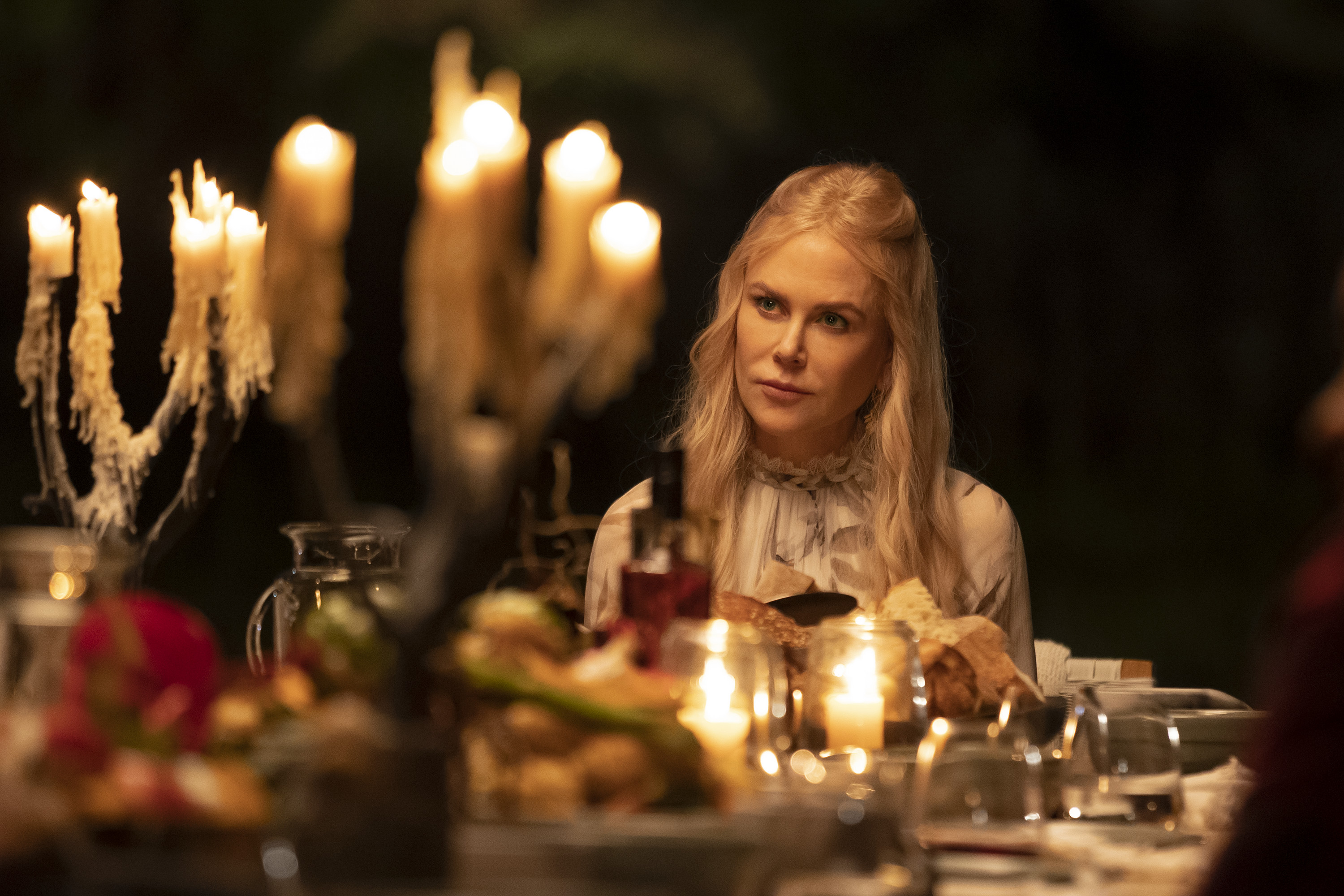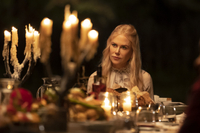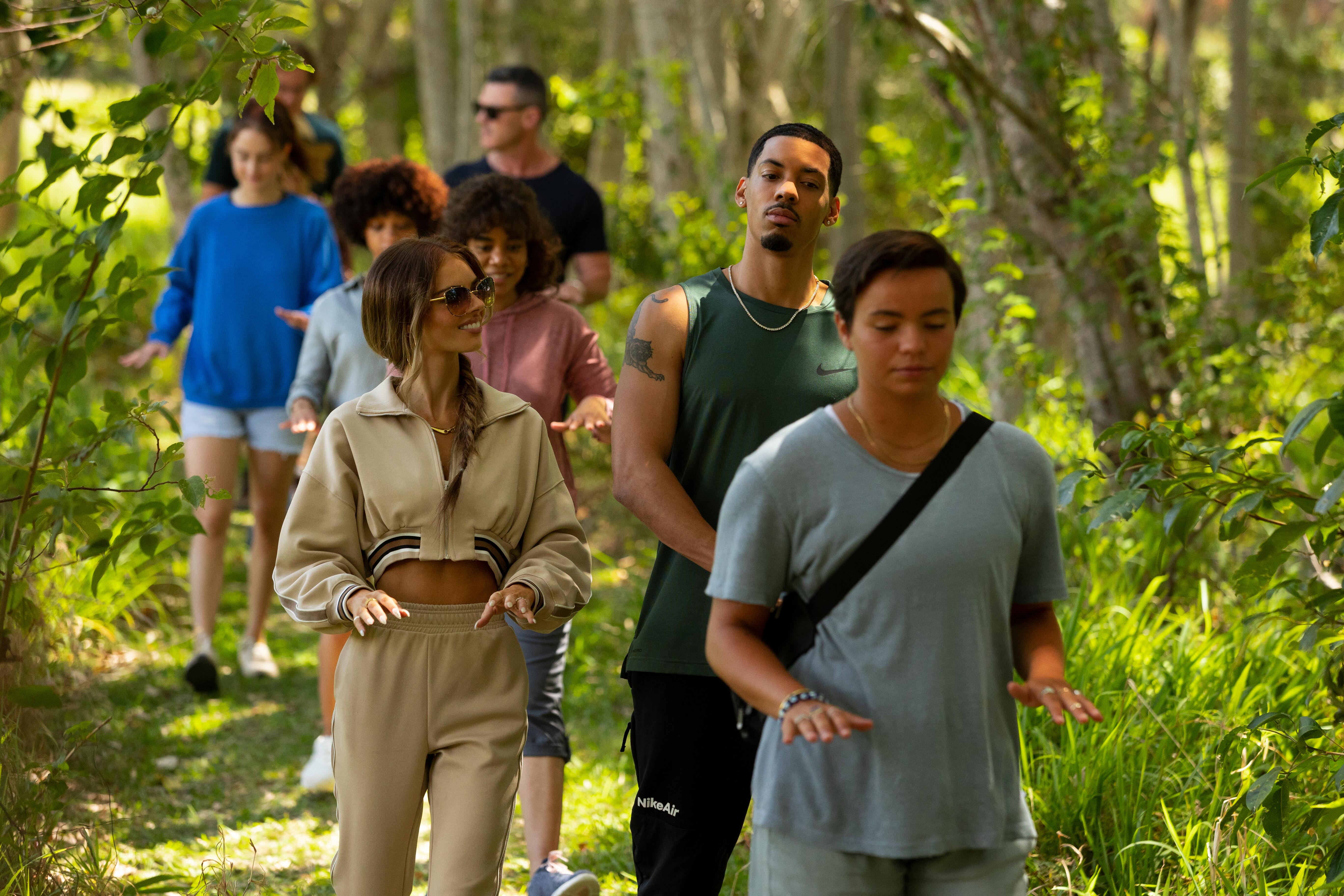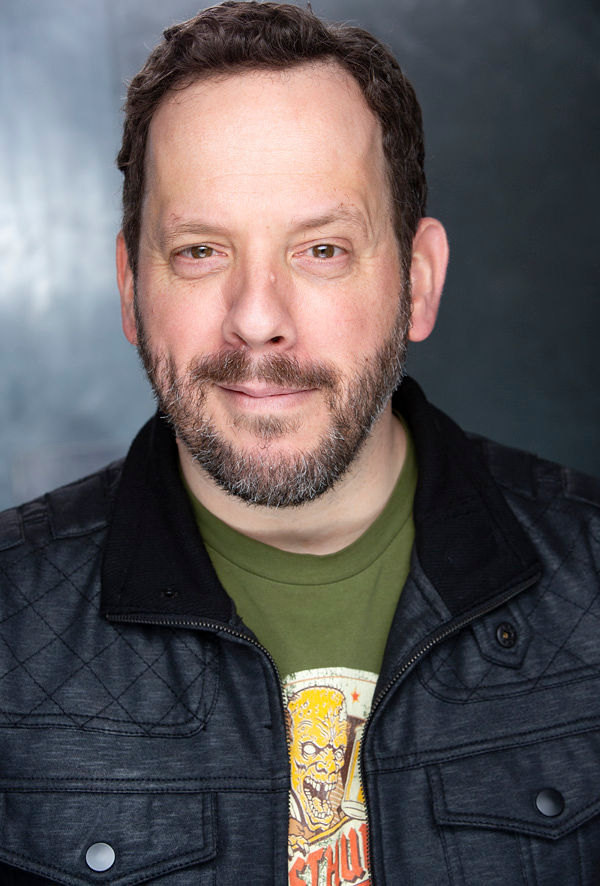'Nine Perfect Strangers' and weaponized wellness
It's trouble in paradise again, and again.


With Hulu's Nine Perfect Strangers, set to drop its first three episodes on Wednesday, August 18, a new trend of isolated escapism has emerged as the year's most intriguing cinematic trope. But unlike the mindless fun of FBOY Island, these claustrophobic jaunts to the tropics are full of some concepts that hit much closer to home, thanks to the shared lockdown we've all experienced over the past year.
How far does one have to go to truly get away from all the bad parts? Not far enough, it seems.
The "trouble in paradise" motif is nothing new, but The White Lotus, HBO's surprise summer hit about a collection of dysfunctional, privileged white guests at an upscale Hawaiian hotel, has helped shine a light on stories of a similar ilk. M. Night Shyamalan's Old takes viewers to an ocean-side retreat where rest and relaxation is the last thing on the menu. On that odd beach, time is most definitely of the essence as each unfortunate visitor rapidly ages, facing their own tragic morbidity front-and-center.
Nine Perfect Strangers, which reunites show-creator David E. Kelley with star Nicole Kidman, and is adapted from the 2018 novel written by Big Little Lies author Liane Moriarty. The series follows the journey of, well, nine perfect strangers who converge on a wellness retreat called Tranquillum House for healing. As we soon find out, things at the mysterious locale are a bit, shall we say, off-kilter. So are the nine illustrious guests looking for transformation.
Michael Shannon, Asher Keddie, and Grace Van Patten make up Napoleon, Heather, and Zoe Marconi — a family broken by shared grief; Melissa McCarthys' Frannie is a successful romance author whose personal life is in ruin; Luke Evans' Lars is a gay investigative reporter there to expose the mysterious establishment for its questionable methods; Samara Weaving and Melvin Gregg are Jessica and Ben Chandler, an attractive social-media-savvy couple with marital problems; and Regina Hall's Carmel is a single mom and recent divorcee simply looking for self-improvement. Her rage and violent tendencies may point to some much deeper concerns.
If there are any positives to come out of the pandemic, it's the growing understanding of trauma and how we deal with our respective demons. Self-care acceptance is on the up-tick, leaving many of us turning to different avenues for healing.
There's a flip side here, though: When left to our own devices for too long, and considering the state of America's medical system and the rampant misinformation spreading online, a mistrust in science leads people to do their own personal research and self-diagnose their problems. Where does real science end and the psuedo-scientific nonsense begin? Where exactly does the wellness end and the damage begin?
The latest updates, reviews and unmissable series to watch and more!

Nine Perfect Strangers, like Shyamalan's Old before it, places an unsuspecting group in a place that may not exactly have their best interests in mind. With some disorienting camera work, zooming up-close into some high-end kitchen appliances to watch organic ingredients get slowly torn into a blood-red malaise (blending smoothies has never looked so violent), it's easy to see how the wellness featured in this show is also a weapon. Is Tranquillim House an evil place?
As director Jonathan Levine explained to Elle, it is. But only kind of.
“The retreat creates a little bit of anxiety in our characters, and that resonates even more in this world [now] than it did when Liane wrote the book,” Levine said. “It’s this concept that the perfect is unsafe, that there are no safe spaces anymore. All these new realities of the COVID world. It’s a little scary when a lack of safety begins to encroach on your leisure time.”
Pervasive in Nine Perfect Strangers and Old is the notion of consent. Both stories feature experimental, even life-threatening practices, presented in a way that brings up issues of medical ethics. But, that's also the reality we're currently living in. Experimental wellness is most definitely a thing, and both stories give us horrific peeks into the ways wellness can be weaponized against us. Who reaps the benefits here? The guests looking for rejuvenation, or the gurus doling out the discomfort?
And before we get too off track here, it's worth pointing out that The White Lotus doesn't, for the most part, anyway, feature such drug use — except for some off-the-wagon benders experienced by a couple hotel staff members. But there's a pervasive notion here that says, if you can afford the trip, taking a sojourn to the tropics can change your life and possibly even make you a better person. In fact, that's pretty much the message that any half-baked wellness tactic can convey when those in need are looking for any accessible methods of care.
This is why shows like Netflix's The Goop Lab was so successful (and polarizing) when it premiered. The streamer has since ordered the Gwynyth Paltrow wellness series for another season. But there is something to be said for the ways in which the program's various messages of healing, and the avenues it offered to acquire such enlightenment (case in point: the company's famous "yoni egg") can be viewed as hackneyed. Criticisms over its thinly-veiled infomercial style led to inquiries of accountability, responsibility, and, really, just questions about who exactly this show benefits. Again, is it the viewer looking to be fixed, or the guru doling out the discomfort?
"I think you think a lot about what you do to cover up your problems," Melissa McCarthey explained during the Nine Perfect Strangers panel at the 2021 Television Critics Association summer tour. "After this last year and a half, masking things doesn’t make them better. And at some point, you have to get them out. [...] it’s like you’re already in the midst of being miserable and suffering, so make a change. And that’s so much what I think this show is about."
If it's one thing we can all agree on it's that leisure time has taken on a completely different meaning since the pandemic began. We should all feel thankful that The White Lotus, Nine Perfect Strangers, and yes, even FBoy Island — which were all shot during the pandemic — for just existing for our own cathartic amusement.
From an audience's perspective, where the thirst for escapism is at an all-time high, these projects have shown us there's still ways to transform pain into art. They've also shown that vacationing to a far-off location, where tropical vices await, may sound like the cure to all our lockdown woes. But that's not always the right answer.
Roadrunner, the new documentary about Anthony Bourdain's life and untimely demise, is a prime example of this. Until we pull all of our personal traumas to bed, outrunning these demons is, and always will be, a mission in futility.
However, when the onus isn't on us, instead, resting on the shoulders of some fictional, flawed person, and we're the ones watching from the outside as they embark on a cringe-inducing journey to achieve some sort of inner nirvana — well that, dear reader, is obviously just great television.
Aaron has been reporting on the entertainment industry for over a decade. He's written for places like The Hollywood Reporter, Playboy, SF Chronicle, The Washington Post, Rotten Tomatoes, and Inverse. Aaron is a member of the Television Critics Association, Critics Choice, and AFTRA SAG. Before entering the journalism game, Aaron was an actor in commercials and TV. He once played Charlize Theron's nerdy boyfriend in a Japanese Honda commercial and co-starred in the Power Rangers sister series VR Troopers.


